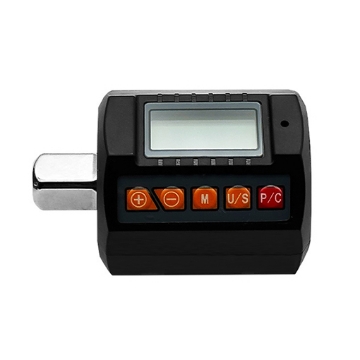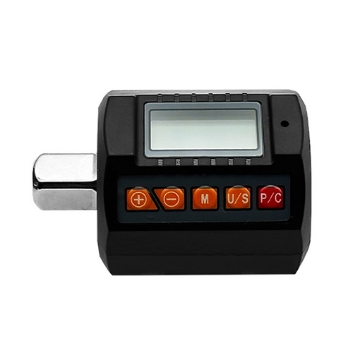Torque Meters
1/2 inch Digital Torque Meter, 0.9~30Nm
1/2 inch Digital Torque Meter Sensor, 4~135Nm
1/2 inch Digital Torque Meter Gauge, 6~200Nm
1/2 inch Digital Torque Meter Tester, 10~340Nm
Electric Screwdriver Torque Meter
Digital Screw Torque Meter
Handheld Electric Torque Meter
Torque Meter Instruction
A torque meter, also known as a torque sensor or torque transducer, is a device used to measure and record the torque on a rotating system, such as an engine, crankshaft, gearbox, or rotor. Torque is the measure of the rotational force applied to an object. Torque meters are essential in various applications, including automotive, aerospace, industrial machinery, and research and development, to ensure that mechanical components operate within their specified torque limits, thereby preventing damage and ensuring optimal performance.
Torque meters can be designed using various technologies, such as strain gauge, piezoelectric, or magnetoelastic principles, each suited for different ranges and types of applications. They often provide output in electrical signals that can be read by data acquisition systems for monitoring and analysis. Accurate torque measurement is crucial for quality control, maintenance, and performance optimization in many mechanical systems.
Working Principle of Torque Meter
Sensor Measurement: The torque meter uses sensors (such as strain gauges or magnetoelastic sensors) to sense the torque applied to the rotating shaft. As the shaft rotates, the applied torque causes deformation in the strain gauge or changes in the magnetic field of the magnetoelastic sensor. These changes are converted into electrical signals.
- Signal Processing: The electrical signals generated by the sensors are amplified, filtered, and conditioned by signal processing circuits to enable more precise measurements. The processed data is typically transmitted to measuring instruments or control systems via analog or digital means.
- Data Output: The processed signals are converted into torque values and displayed on a screen, or output to a computer or control system for further analysis and use.
- Calibration and Compensation: The torque meter needs to be calibrated before use to ensure the accuracy of the measurements. Additionally, the effects of temperature, vibration, and other environmental factors need to be compensated for to ensure measurement stability and precision.
Applications of Torque Meter
Torque meters are widely used in various applications due to their precision in measuring rotational force:
- Automotive Industry: They are employed in testing engine performance, drivetrain components, and in assembly lines to ensure bolts and nuts are tightened to the correct specifications. This helps in maintaining vehicle safety and performance.
- Manufacturing: In manufacturing processes, torque meters are used to monitor and control torque in machinery and equipment, ensuring consistent product quality and optimizing processes like extrusion, molding, and machining.
- Aerospace: They are crucial for testing and calibrating aircraft components and systems, where accurate torque measurements are essential for safety and reliability.
- Research and Development: In R&D settings, torque meters are used to analyze and develop new products, materials, and technologies by providing precise torque data during testing and experimentation.








